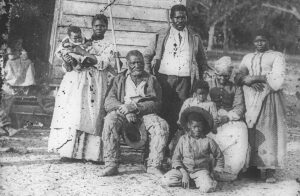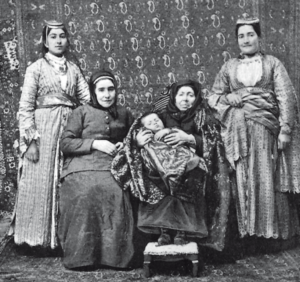 Maybe you’ve had this experience: you’re a child at the dinner table in your childhood home. One of your parents mentions the name of a relative—a father, a sister, a great aunt. The room goes silent and the subject is quickly changed. As Tolstoy famously wrote: “All happy families are alike; each unhappy family is unhappy in its own way.” I would add: “All families have secrets, but each secret is unique to that family.”
Maybe you’ve had this experience: you’re a child at the dinner table in your childhood home. One of your parents mentions the name of a relative—a father, a sister, a great aunt. The room goes silent and the subject is quickly changed. As Tolstoy famously wrote: “All happy families are alike; each unhappy family is unhappy in its own way.” I would add: “All families have secrets, but each secret is unique to that family.”
Family secrets most often involve a person who has shamed kin, or an event, like exile or deportation, abortion, or even murder. The silence surrounding the troubles can feel like safety, but the safety is illusory. What is hidden does not disappear. Through epigenetic research and a deeper psychological understanding of inherited trauma, we have come to understand that “the ghost or ghosts in the room” make their presence felt by presenting within the family as symptoms, physical, mental and spiritual. What is now known is that the pattern of silence and dissociation established at the onset of the original trauma can be passed on to future generations.
Transgenerational trauma is at the heart of my second novel, The Lie of Forgetting. At mid-life, my narrator’s world collapses, and she must piece together her own difficulties as they relate to the hidden trauma of a death in the family that has been forgotten, physically split off, for generations. I have also blogged about this here before in “The Things We Carry: How Our Ancestors’ Traumas May Influence Who We Are.”
 In researching this subject, I became aware of the stunning work of family constellation therapist Nikki Mackay with patients suffering from inherited trauma and sought her counsel as a wise guide and tutor, not just as a writer but in my personal life as well.
In researching this subject, I became aware of the stunning work of family constellation therapist Nikki Mackay with patients suffering from inherited trauma and sought her counsel as a wise guide and tutor, not just as a writer but in my personal life as well.
I hope you will find her answers to my many questions as intriguing and enlightening as I did.
What is family and ancestral constellation therapy?
Who we are in the present moment is knowingly and unknowingly influenced by the energetic field of influence that flows through us from our family and ancestors. Their history lies coiled within us. The untold stories of our ancestors are in our blood.
Family and ancestral constellation is a therapeutic tool that allows the invisible influences from the present and past to be made visible, acknowledged and whole. It allows us as individuals to uncover the hidden historical narrative that we are unconsciously holding. It creates a space for us to bear witness and give place to the trauma before fully and freely moving forward with our own life. It is the key to unlocking the missing parts of who we are.
How would we know if we would benefit from working with a family constellation therapist?
Have you ever wondered why you choose the things you choose? Why you are drawn to the people that you love—even if some of your choices don’t always feel safe for you? We are constantly surrounded by a field of influence made up of not only our family and ancestors but also from the relationships and connections that we have created throughout our life
 That connection to the people that you have known and loved stays with you, the cost of the choices you have made stays with you and the influence of the family and ancestors that you come from stays with you. Their memories, the imprint of them, flows through your memories consciously and unconsciously.
That connection to the people that you have known and loved stays with you, the cost of the choices you have made stays with you and the influence of the family and ancestors that you come from stays with you. Their memories, the imprint of them, flows through your memories consciously and unconsciously.
That field of influence impacts our belonging and sense of self. It is the heaviness within our heart after a tricky day, it is the emptiness we can feel when we know that something just isn’t quite right, it is the fear that grips us when things change out of the blue and we aren’t in control. It is the unconscious belief that we are not enough.
How is family constellation work different from other forms of therapy?
By working with your own individual historical narrative, the untold or silenced stories that we are each unconsciously holding, you have the opportunity to disentangle the emotional trauma that you are unconsciously entangled with. To literally disentangle yourself from it and shift the influence of it outside of yourself. This therapy allows us to give place, and bear witness, to the trauma and also to liberate ourselves from it. To exist outside of it so that the inherited patterns don’t continue to repeat from one generation to the next.
 In setting up a constellation we each enter a version of “trauma time,” where within the created constellation past and present are not separate and we experience them as we are influenced by them. For example, you may wish to explore your relationship with a current partner and find yourself in the field of influence of your great-great-grandmother who is carrying the broken promise of a lost love from a different country.
In setting up a constellation we each enter a version of “trauma time,” where within the created constellation past and present are not separate and we experience them as we are influenced by them. For example, you may wish to explore your relationship with a current partner and find yourself in the field of influence of your great-great-grandmother who is carrying the broken promise of a lost love from a different country.
Is it really true that unresolved, unacknowledged and traumatic events from the past can be unconsciously carried down from generation to generation?
Yes, it is. In essence, constellation allows for the creation of an energetic map of all of the connections and loyalties, known and unknown, within the field of influence upon us where we can interact with and explore the entangled connections. It is based on the principle of the inter-connectedness of all things so that each person within a family, going back generation upon generation, has an equal place of belonging within that family. When someone in the family is excluded, or there is an event or entanglement that is not seen or acknowledged by the rest, then this has an effect on the family as a whole.
Please talk a bit about the evidence for that, how we know it.
 Traumatic events exert a force long after our ancestors have died. Science has shown that trauma can be genetically passed down the generations. Recent research has shown evidence of epigenetic transgenerational transmission of trauma by looking, for example, at the inheritance of holocaust trauma, Native American genocide and trauma within current descendants of the American Civil War. Quantum mind and entangled memory research has also been exploring the use of language and the power of bearing witness and “seeing” an entanglement to begin the process of disentanglement. I am also working on research looking at the efficacy of constellation as a tool for understanding conflict with a view toward disentangling the historical narrative of the trauma from current, intractable, conflict situations.
Traumatic events exert a force long after our ancestors have died. Science has shown that trauma can be genetically passed down the generations. Recent research has shown evidence of epigenetic transgenerational transmission of trauma by looking, for example, at the inheritance of holocaust trauma, Native American genocide and trauma within current descendants of the American Civil War. Quantum mind and entangled memory research has also been exploring the use of language and the power of bearing witness and “seeing” an entanglement to begin the process of disentanglement. I am also working on research looking at the efficacy of constellation as a tool for understanding conflict with a view toward disentangling the historical narrative of the trauma from current, intractable, conflict situations.
Can you give an example of a case of someone who has been helped by constellation therapy?
Sharon was a client who had initially participated in a group session focusing on her career and dreams. Her circumstances were complex. Her family, going back several generations, were from Guernsey, one of the Channel Islands located between Britain and France. When we first started working together, she was living in the U.K. in London and was having issues in her working life as well as her relationship with her fiancé. Her relationship with her mother, who lived in the family home in Guernsey, was very close. Her mother’s health was beginning to deteriorate and Sharon made the decision to move back to the family home to care for her. She resigned from the job that she was unhappy in and felt positive about her choice.
However, as her mother’s health deteriorated, so did her relationship with her fiancé. When her mother had to be admitted to a hospice, her fiancé chose that moment to end the relationship. Shortly thereafter, Sharon’s mother passed away. Sharon became withdrawn and isolated in the months that followed. She found it difficult to leave the family home, which she had inherited, and could not contemplate leaving the island. At that point, she contacted me to arrange a series of individual sessions. The obvious place to begin was the exploration of Sharon’s grief around her mother’s death. Although this created a little breathing space for Sharon it became clear that there was more than grief influencing her present situation. When Sharon worked on the connection with her mother, she lost a sense of her own place and identity.
 Bringing in her grandmother and great-grandmother gave some relief to Sharon, particularly her great-grandmother; however, they too were held tightly within Sharon’s place. She had no awareness of herself, only them and the land in Guernsey. I asked Sharon if there had been any lost loves connected with her great-grandmother. She shared that her great-grandmother had been engaged before her marriage to Sharon’s great-grandfather but her fiancé, a young fisherman, had died at sea.
Bringing in her grandmother and great-grandmother gave some relief to Sharon, particularly her great-grandmother; however, they too were held tightly within Sharon’s place. She had no awareness of herself, only them and the land in Guernsey. I asked Sharon if there had been any lost loves connected with her great-grandmother. She shared that her great-grandmother had been engaged before her marriage to Sharon’s great-grandfather but her fiancé, a young fisherman, had died at sea.
Part of Sharon’s great-grandmother had held on to the promise to wait on the land for him to return. This promise to “be the one who waits” had passed from one generation to the next. It had passed to Sharon and she had been unknowingly holding the promise along with the weight of the grief within the relationship promise between her and her fiancé. Her return to the Island and her mother’s death had triggered the inherited trauma within her and her own relationship. By uncovering and releasing the entanglement, Sharon was able to move forward freely with her life. She chose to stay on the island in the family home as her base but now regularly travels to London for work and has begun to date again.
Do you offer sessions online? Do you also work with groups? How does a group session differ from an individual session?
I have a large therapy practice focusing on individual sessions in person and online allowing me to work with clients globally. I also work with groups in Europe and the USA as well as sharing my knowledge with students through constellation learning and supervision.
The creation of a constellation needs to begin with the asking of a specific question. This question sets the intention that establishes the influent field upon the created constellation and the lens through which the constellation is experienced. Then there is the initial placement of the represented loyalties and emotional entanglements relevant to the question, which creates an energetic “map.” This initial map can either be set up in your mind’s eye or physically created using mats or people in a group-represented constellation. The map you create within the constellation reflects your inner perception of the situation that you wish to explore. The process is the same however you choose to step into it.
References:
Epigenetic transmission of Holocaust Trauma: Can nightmares be inherited? By Natan P.F. Kellermann, AMCHA, Israel
Intergenerational Trauma: Understanding Natives’ Inherited Pain by Mary Annette Pember
This post appeared in a slightly different form on Dale’s blog on Psychology Today. You can find all of Dale’s blog posts for Psychology Today at